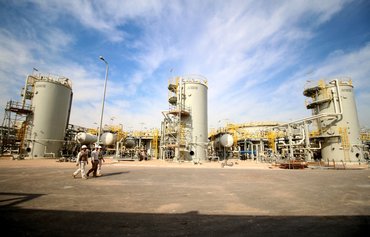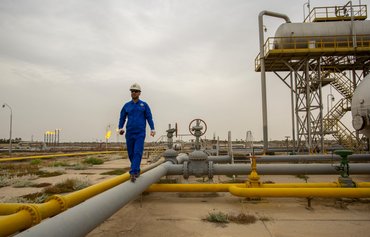The Syrian regime has been conducting a media disinformation campaign that attempts to blame others for the ongoing economic and energy crisis, even as its own allies profit from the exploitation of the country's natural resources.
As citizens struggle with oil shortages, the Syrian regime and its allies, including Russia-backed and Iran-aligned militias, remain the main beneficiaries of the country's remaining oil wealth, Syrian observers told Al-Mashareq.
The regime has entered into a number of contracts with Iranian and Russian companies -- including some linked to a Russian mercenary group -- seeking to invest in the oil and gas sector.
Yet when oil shortages paralyse the country, Damascus-aligned media outlets have predictably sought to point the finger at the regime's adversaries.
![Cars line up at a gas station in Syria, where the public has grappled with fuel scarcity and high fuel prices. [SANA News Agency]](/cnmi_di/images/2023/05/11/42091-syria-gas-station-600_384.jpg)
Cars line up at a gas station in Syria, where the public has grappled with fuel scarcity and high fuel prices. [SANA News Agency]
They have accused the United States of stationing troops around Syrian oil fields, thereby depriving Syrians of this natural resource, and claim that US sanctions have driven the country into poverty.
This is not true, Syrians with knowledge of the situation told Al-Mashareq.
The amount of oil extracted and managed by the US-allied Kurdish administration is not even sufficient to meet the needs of the Syrian Democratic Forces (SDF) or civilians in the area, SDF officer Farhad Khoja said.
Shortages of fuel are especially galling to the Syrian people as the country has ample natural resources, he said.
Moreover, it is clear that the regime of Bashar al-Assad is responsible for the country's economic collapse, the low value of the currency and the acute shortage of bare necessities, Khoja said.
Insufficient production
Syria produced about 400,000 barrels of oil per day before the conflict, but there has been a significantly decreased output in recent years, said Ayman Safadi, who has worked in Deir Ezzor as an oil facility maintenance manager.
Most of the country's major oil wells are situated in eastern Syria, where international companies used to operate, he told Al-Mashareq.
After 12 years of war, Safadi said, many oil wells have suffered extensive damage and have not been repaired, so the number of operational oil wells has considerably decreased.
Meanwhile, armed groups have taken control of oil extraction operations and profited from them, he added.
The amount of oil that is currently extracted is not sufficient to meet the needs of the general public, including electricity and fuel for agricultural machinery and generators, Safadi said.
This shortage is acutely felt in northern and eastern Syria, he added.
According to Syrian government data, some 80,000 barrels of oil were produced per day in 2022, but only about 14,500 barrels reached the country's refineries, said Syrian economist and Damascus University lecturer Mahmoud Mustafa.
He noted that all the figures published by the Syrian government are estimates, as it does not have the means to monitor the amount of oil extracted in northern and eastern Syria.
The Syrian regime has attempted to deflect blame for the country's economic and energy crisis by leveraging baseless accusations against the United States and its allies for seizing the remaining amount of oil, Mustafa said.
According to Khoja, the SDF officer, the regime's accusations are "utterly ridiculous".
Oil exploitation
In its published figures, the Syrian government has not included the many oil wells operated and controlled by Russia and Iran, such as al-Ward, al-Taym, al-Hammar and al-Hasyan wells, Mustafa said.
He noted that 2,500 barrels a day are produced by the Russian-operated al-Taym field alone.
The Syria government figures are totally incorrect, he said, and the low estimates merely serve as part of the regime's media disinformation campaigns against the international coalition and its partners on the ground.
Russia has recently entered into several oil exploration and extraction contracts with the regime in various areas of Syria, particularly near Damascus and in the Eastern Desert (Badiya) near Palmyra, as well as in the coastal areas, he said.
But the amount of oil that is extracted as a result of these contracts is neither disclosed nor included in the recently released government figures, he said.
After the Russian military intervention in Syria in late 2015, the Syrian regime signed contracts with Russian companies to invest in the oil and gas sectors in Syria and its territorial waters, Asharq al-Awsat reported in November 2022.
Damascus also signed a contract with Evro Polis -- the company linked to Russian businessman and Wagner Group chief Yevgeny Prigozhin -- to "protect" oil and natural gas facilities in exchange for 25% of the proceeds, it said.
The Syrian regime's media disinformation campaign will likely continue, aimed at facilitating the entrance and activity of Russian companies in the region, Mustafa said.
The Chinese also are moving in this direction, he noted, while major international companies are moving away from investing in the Syrian oil sector.

![Tanker trucks belonging to the al-Qaterji Oil Transport Company transport crude oil from eastern Syria to regime-controlled areas. [Workers of Al-Qaterji Oil Transport Company Facebook page]](/cnmi_di/images/2023/05/11/42090-syria-oil-tankers-600_384.jpg)






